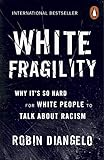White Fragility book summary

Whilst I didn't fully agree with a lot of how the author communicated her message, there were definitely some points she made that made me reflect more about myself, my bias and my attitudes to others who are different to me.
The points below are direct quotes from Robin DiAngelo's book.
- White fragility is not weakness per se. In fact, it is a powerful means of white racial control and the protection of white advantage.
- White fragility functions as a form of bullying; I am going to make it so miserable for you to confront me—no matter how diplomatically you try to do so—that you will simply back off, give up, and never raise the issue again.
- It is white people’s responsibility to be less fragile; people of color don’t need to twist themselves into knots trying to navigate us as painlessly as possible.
- An antidote to white fragility is to build up our stamina to bear witness to the pain of racism that we cause, not to impose conditions that require people of color to continually validate our denial.
- …if we whites want to interrupt this system, we have to get racially uncomfortable and be willing to examine the effects of our racial engagement. This includes not indulging in whatever reactions we have–anger, defensiveness, self-pity, and so forth–in a given cross-racial encounter without first reflecting on what is driving our reactions and how they will affect other people.
- I believe that white progressives cause the most daily damage to people of color. I define a white progressive as any white person who thinks he or she is not racist, or is less racist, or in the “choir,” or already “gets it.” White progressives can be the most difficult for people of color because, to the degree that we think we have arrived, we will put our energy into making sure that others see us as having arrived.
- I was co-leading a workshop with an African American man. A white participant said to him, "I don't see race; I don't see you as black." My co-trainer's response was, "Then how will you see racism?"
- White people raised in Western society are conditioned into a white supremacist worldview because it is the bedrock of our society and its institutions. Regardless of whether a parent told you that everyone was equal, or the poster in the hall of your white suburban school proclaimed the value of diversity, or you have traveled abroad, or you have people of color in your workplace or family, the ubiquitous socializing power of white supremacy cannot be avoided. The messages circulate 24-7 and have little or nothing to do with intentions, awareness, or agreement. Entering the conversation with this understanding is freeing because it allows us to focus on how--rather than if--our racism is manifest. When we move beyond the good/bad binary, we can become eager to identify our racist patterns because interrupting those patterns becomes more important than managing how we think we look to others.
- If I believe that only bad people are racist, I will feel hurt, offended, and shamed when an unaware racist assumption of mine is pointed out. If I instead believe that having racist assumptions is inevitable (but possible to change), I will feel gratitude when an unaware racist assumption is pointed out; now I am aware of and can change that assumption.
- While implicit bias is always at play because all humans have bias, inequity can occur simply through homogeneity; if I am not aware of the barriers you face, then I won’t see them, much less be motivated to remove them. Nor will I be motivated to remove the barriers if they provide an advantage to which I feel entitled.
- When white people ask me what to do about racism and white fragility, the first thing I ask is, “What has enabled you to be a full, educated, professional adult and not know what to do about racism?”
- The key to moving forward is what we do with our discomfort. We can use it as a door out—blame the messenger and disregard the message. Or we can use it as a door in by asking, Why does this unsettle me? What would it mean for me if this were true?